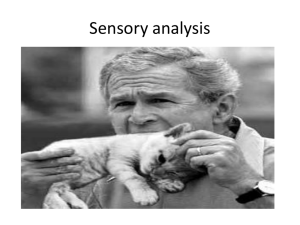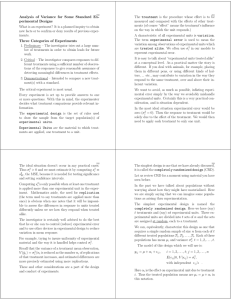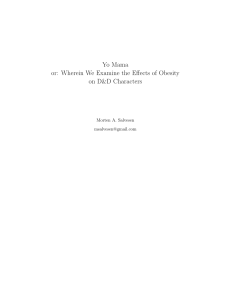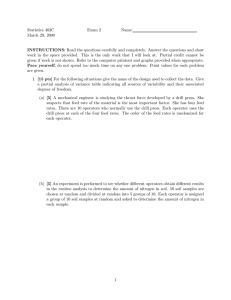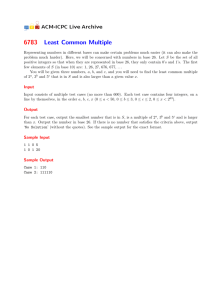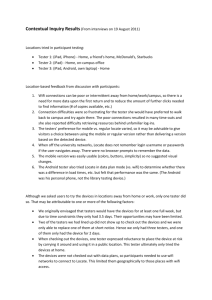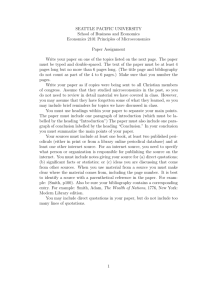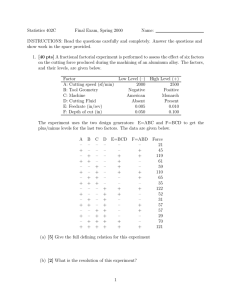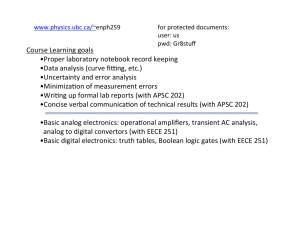Document
advertisement
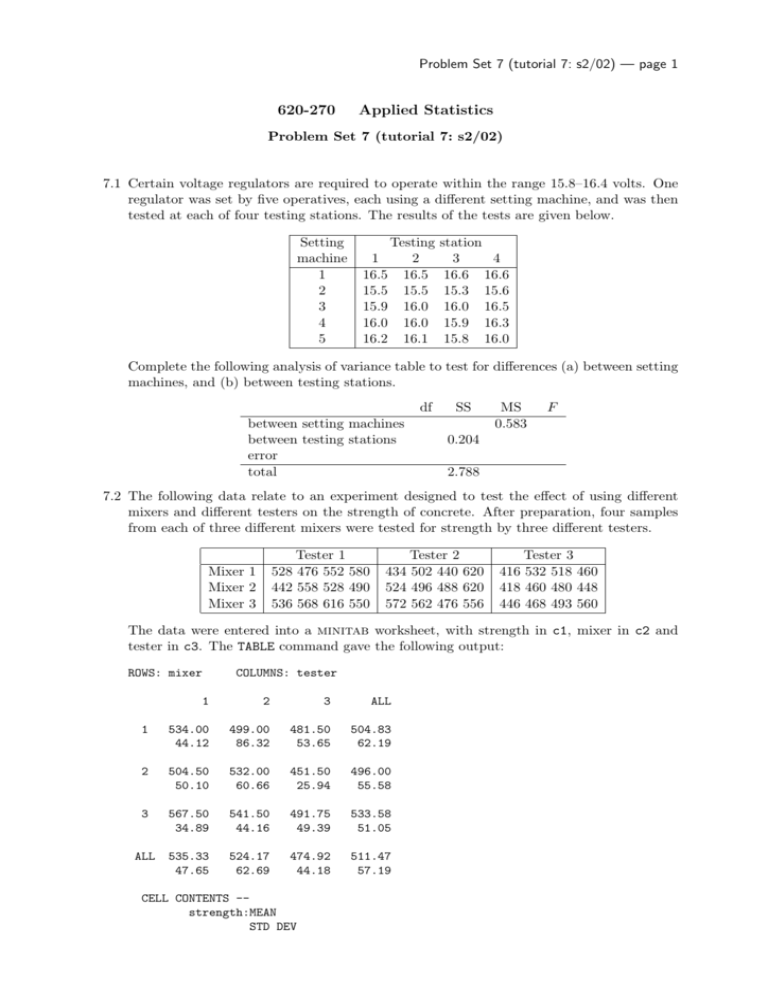
Problem Set 7 (tutorial 7: s2/02) — page 1 620-270 Applied Statistics Problem Set 7 (tutorial 7: s2/02) 7.1 Certain voltage regulators are required to operate within the range 15.8–16.4 volts. One regulator was set by five operatives, each using a different setting machine, and was then tested at each of four testing stations. The results of the tests are given below. Setting machine 1 2 3 4 5 1 16.5 15.5 15.9 16.0 16.2 Testing 2 16.5 15.5 16.0 16.0 16.1 station 3 4 16.6 16.6 15.3 15.6 16.0 16.5 15.9 16.3 15.8 16.0 Complete the following analysis of variance table to test for differences (a) between setting machines, and (b) between testing stations. df between setting machines between testing stations error total SS MS 0.583 F 0.204 2.788 7.2 The following data relate to an experiment designed to test the effect of using different mixers and different testers on the strength of concrete. After preparation, four samples from each of three different mixers were tested for strength by three different testers. Tester 1 528 476 552 580 442 558 528 490 536 568 616 550 Mixer 1 Mixer 2 Mixer 3 Tester 2 434 502 440 620 524 496 488 620 572 562 476 556 Tester 3 416 532 518 460 418 460 480 448 446 468 493 560 The data were entered into a minitab worksheet, with strength in c1, mixer in c2 and tester in c3. The TABLE command gave the following output: ROWS: mixer COLUMNS: tester 1 2 3 ALL 1 534.00 44.12 499.00 86.32 481.50 53.65 504.83 62.19 2 504.50 50.10 532.00 60.66 451.50 25.94 496.00 55.58 3 567.50 34.89 541.50 44.16 491.75 49.39 533.58 51.05 ALL 535.33 47.65 524.17 62.69 474.92 44.18 511.47 57.19 CELL CONTENTS -strength:MEAN STD DEV Problem Set 7 (tutorial 7: s2/02) — page 2 (a) Plot (by hand) the nine means in an “interaction plot”, (like the plots on page 70 of the notes). Do you think there are (i) differences between mixers? (ii) differences between testers? (iii) an interaction between mixers and testers? (b) We will firstly fit an additive model to the data. i. Use the information in the above minitab output to compute the total SS, SS due to mixer and SS due to tester. ii. Construct the ANOVA table for an additive model. iii. Test whether there is any difference between the mixers. iv. Test whether there is any difference between the testers. v. Find an estimate of σ. (c) We now wish to fit an interactive model to the data. i. The SS due to interaction is 6161. Construct an ANOVA table for the interactive model. ii. Test whether an additive model is appropriate. 7.3 The following data are percentage yields in a chemical process. temperature level 1 temperature level 2 Catalyst 1 91 93 90 94 Catalyst 2 88 86 95 94 Catalyst 3 93 92 90 87 The following output is from minitab: SOURCE temp catalyst INTERACTION ERROR TOTAL DF 1 2 2 6 11 SS 4.08 5.17 68.17 17.50 94.92 MS 4.08 2.58 34.08 2.92 (a) Test whether the interaction is significant. Explain the interaction using four of the six means for the different treatment combinations. (b) Use a suitable model to test whether the main effects are significant. Comment on whether this is a useful thing to do. 7.4 An experiment was conducted to compare the yields of orange juice for six different juice extractors. Because of a possibility of a variation in the amount of juice per orange from one batch to another, equal weights of oranges from each batch were randomly assigned to each extractor. This process was repeated for fifteen batches. The amount of juice was recorded for the oranges sent to each extractor from each batch, resulting in the following incomplete analysis of variance table: df between batches between extractors error total SS 159.29 84.71 MS F 338.33 (a) What type of experimental design was used? What were the experimental units? What were the treatments? (b) Complete the ANOVA table. (c) Do the data provide sufficient evidence to indicate a difference in the mean amount of juice extracted by the six extractors? Explain. Problem Set 7 (tutorial 7: s2/02) — page 3 7.5 When metal pipe is buried in soil it is desirable to apply a coating to retard corrosion. Four coatings are under consideration for use with pipe that will ultimately be buried in three types of soil. An experiment to investigate the effects of these coatings and soils was carried out by first selecting 12 pipe segments and applying each coating to three segments. The segments were then buried in soil for a specified period in such a way that each soil type received one piece with each coating. The resulting data (depth of corrosion) is given below. Coating 1 2 3 4 Soil type 1 2 3 68 53 54 53 51 48 44 42 47 51 43 52 (a) Assuming that there is no interaction between coating and soil type, test for possible effects of coating and soil type. (b) Find 95% confidence intervals for differences between the mean of level 1 and the other levels, for any significant factors. 7.6 The following observations are standardised yields from 24 plots divided into four blocks, each containing six similar plots. Three treatments were applied twice in each block, as indicated. block 1 block 2 block 3 block 4 total control 0, 1 –1, –2 0, 2 3, 5 8 Analysis of Variance for y source df ss blocks 81 treatments error total 144 treatment F 1, –1 2, 1 1, 2 2, 4 12 treatment G 2, 0 1, 2 4, 3 7, 9 28 total 3 3 12 30 48 ms (a) For these data, show that the sum of squares due to treatments is equal to 28, and complete the above analysis of variance table. Assuming an additive model with independent normally distributed errors having equal variances: (b) test the significance of the treatment effects. (c) find an estimate of the error variance. (d) find a 95% confidence interval for the mean yield with treatment G. (e) find a 95% confidence interval for the effect of treatment G, i.e., the difference in mean yield for treatment G compared to the control (no treatment). (f) Use the following minitab output to find the interaction sum of squares and hence how significant the interaction is. A large contribution to the interaction is made by one cell — which one is it? Problem Set 7 (tutorial 7: s2/02) — page 4 MTB > print c1-c4 Row y block treat 1 0 1 1 2 1 1 1 3 1 1 2 4 -1 1 2 5 2 1 3 6 0 1 3 : : : : MTB > oneway c1 c4 Analysis of Variance on y Source DF SS cell 11 129.00 Error 12 15.00 Total 23 144.00 cell 1 1 2 2 3 3 : MS 11.73 1.25 F 9.38 p 0.000

